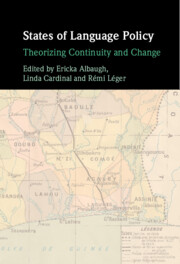Book contents
- States of Language Policy
- States of Language Policy
- Copyright page
- Contents
- Figures
- Tables
- Contributors
- Acknowledgments
- Introduction
- Part I Routes of Change
- Part II Dependent Relationships
- 7 African State Traditions and Language Regimes
- 8 Algeria’s Language Regime
- 9 Language Politics in India
- 10 Lost in Traditions? Continuity and Change in Hong Kong’s Language Regime
- Part III Levels of Governance
- Conclusion
- Index
- References
9 - Language Politics in India
Tradition, Regime, and Diversity
from Part II - Dependent Relationships
Published online by Cambridge University Press: 14 November 2024
- States of Language Policy
- States of Language Policy
- Copyright page
- Contents
- Figures
- Tables
- Contributors
- Acknowledgments
- Introduction
- Part I Routes of Change
- Part II Dependent Relationships
- 7 African State Traditions and Language Regimes
- 8 Algeria’s Language Regime
- 9 Language Politics in India
- 10 Lost in Traditions? Continuity and Change in Hong Kong’s Language Regime
- Part III Levels of Governance
- Conclusion
- Index
- References
Summary
This chapter deals with the Algerian language regime and its formation/operation during the history of contemporary Algeria, making the Amazigh language activism the common thread through which this language regime has been shaped. The objective is to present a particular postcolonial language regime, which reflects an entire political system. Indeed, it approaches the situation of languages from a double perspective: the status conferred and the status anticipated/expected. The balance, or not, between the two levels helps to define the type of language regime and its stability. However, in this case study, the fact that the Amazigh language is marginalized and far from meeting the expectations of those who claim it, means that the gap between the two statuses is significant. Thus, taking the Amazigh claims as a guideline for approaching the Algerian language regime seems to be the most efficient way to understand and present this language regime. It is the Amazigh language that has experienced the most intense activism. This seems to have weighed the most in the Algerian language regime, pushing it from the inside to evolve, in particular through the critical junctures of political crises.
- Type
- Chapter
- Information
- States of Language PolicyTheorizing Continuity and Change, pp. 169 - 189Publisher: Cambridge University PressPrint publication year: 2024

